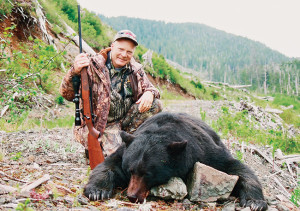November 05, 2014
By David Hart
 Bear hunters in Maine can rest easy. Voters rejected Question 1, a ballot initiative that would have banned the use of bait, hounds and leg-hold traps "except to protect property, public safety or for research" by a margin of 54- to 46-percent.
Bear hunters in Maine can rest easy. Voters rejected Question 1, a ballot initiative that would have banned the use of bait, hounds and leg-hold traps "except to protect property, public safety or for research" by a margin of 54- to 46-percent.
Mainers for Fair Bear Hunting, which led the anti-hunting efforts, spent $2.7 million on Question 1. Just 3-percent of that money came from in-state sources, according to United States Sportsmen's Alliance president Nick Pinozzotto. The rest came from the Humane Society of the United States, the world's largest and wealthiest anti-hunting organization. In some ways, the defeat of Question 1 was a rejection of outside interests, says Pinozzotto.
"People don't like outsiders coming in and telling them what to do and that's what was happening in Maine," he says.
Sportsmen's Alliance of Maine executive director David Trahan agrees.
Advertisement
"They were passing out brochures that had photos of grizzly bears on them. We don't have grizzlies in Maine. They were also using photos that had eight or nine hounds. Maine law restricts hunters to six hounds. It just goes to show how little they really knew about the issue," says Trahan. "The anti-hunters thought we were stupid. Voters saw right through that."
Question 1 was also defeated at the hands of a strong grassroots coalition that passed out 80,000 pieces of fact-filled literature over the course of the past several months. Trahan says volunteers went door-to-door and worked the phones at SAM's office in Augusta. SAM also passed out 14,000 yard signs.
"We put forth the message that wildlife management should remain in the hands of our professional biologists and not the voters. Our wildlife department was vocal in their opposition to Question 1 and they made a very strong case, as well," adds Trahan.
Advertisement
Support was strongest in rural Maine where bear populations are highest and the hunting tradition is strongest. In fact, Trahan thinks the relatively high voter turnout helped Republican Governor Paul LePage fend off challengers. LePage is a strong Second Amendment supporter.
"We not only preserved the bear hunting tradition, we also prevented any attacks on our Second Amendment rights by re-electing LePage," said Trahan.
This was the second time anti-hunting groups put sound wildlife management and the state's hunting traditions on the ballot. A 2004 referendum nearly identical to Question 1 was defeated by a six-point margin.
Despite the blow to the Humane Society and other anti-hunting groups, Pinozzotto thinks they will be back, but he's not sure when or what their angle of attack might be.
"I expect it will be a while before they make another attempt at bear hunting in Maine, but you can be certain they are already working on taking away some other hunting tradition somewhere. It's what they do," he says.
Trahan agrees.
"They may go after baiting, but I think after this loss, they will most likely look to another state," says Trahan. "They got knocked down pretty hard."
Ironically, a spokesman for Mainers for Fair Bear Hunting was recently issued a summons by a state game warden for shooting a grouse from the window of his vehicle. Joel Gibbs, who wrote an op-ed for the Bangor Daily News in October about the ethics of fair chase and his opposition to bear baiting and hounding, denied the allegations.
Enjoy articles like this?
Subscribe to the magazine.
Get access to everything Guns & Ammo has to offer.
Subscribe to the Magazine

